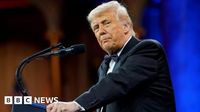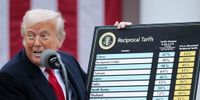President Donald Trump’s sweeping tariffs on countries around the world, including a staggering 104% levy on Chinese imports, took effect early Wednesday, April 9, 2025. This dramatic move is reshaping the global trade landscape, and it comes amid escalating tensions between the United States and its major trading partners.
At a National Republican Congressional Committee dinner on Tuesday, Trump hinted at further tariffs on pharmaceutical products "very shortly," signaling an aggressive stance on trade that has already drawn both domestic and international reactions. Nearly 70 nations have approached the White House to negotiate, but Trump has made it clear that the U.S. is not in a hurry to make deals. "We don’t necessarily want to make a deal with them. We’re happy the way we are, taking our $2 billion a day, but they want to make a deal with us," he stated.
These tariffs, which range from 11% to 104%, are being applied to imports from around 60 U.S. trade partners, all of which Trump has labeled the "worst offenders" for what he considers unfair trade practices. In retaliation, China has raised import duties on U.S. goods arriving in the country to 84%, marking a significant escalation in the ongoing trade conflict.
The global markets reacted negatively to the announcement of these tariffs, with losses amounting to trillions of dollars. Many Americans are now bracing for potential price increases, and analysts are warning that the odds of a recession may be increasing. Trump, however, remains optimistic, claiming at the Republican dinner that money has been "pouring in" from the new tariffs.
Despite acknowledging that the 104% tariff rate on China "sounds ridiculous," Trump insisted that Beijing is eager to negotiate. "They want to make a deal. They just don’t know how to get started because they’re proud people," he said, showcasing his belief that the U.S. holds the upper hand in these negotiations.
However, China has firmly stated its intention to "fight to the end" if the U.S. continues to provoke a tariff war. Lin Jian, a spokesman for China’s foreign ministry, criticized the U.S. for its "abusive" tariff practices and emphasized that negotiations require an attitude of equality and mutual respect.
In the wake of these tariffs, delegations from Japan and South Korea are en route to Washington, as import taxes of 24% for Japan and 25% for South Korea are set to take effect. The European Union, facing a 20% tariff, has expressed readiness to negotiate, with European Commission President Ursula von der Leyen proposing a mutual reduction of tariffs on industrial goods to zero—a proposal that Trump has praised but still deemed "not enough."
In addition to China, other countries on Trump’s "worst offenders" list include Cambodia, which is now under a 49% tariff, Vietnam at 46%, and India at 26%. The fallout from these tariffs has sparked significant market turmoil, with major indices like London’s FTSE 100 and Japan’s Nikkei 225 experiencing substantial declines.
As the tariffs took effect on Wednesday, the divisions within the White House appeared to intensify, highlighted by a public feud between Tesla CEO Elon Musk and Trump’s trade adviser Peter Navarro. Musk referred to Navarro as "dumber than a sack of bricks," indicating the internal conflicts that may be brewing as the administration navigates this complex trade landscape.
Looking ahead, Treasury Secretary Scott Bessent has indicated that trade talks could extend into June, suggesting that the negotiations will be lengthy and complicated. White House press secretary Karoline Leavitt confirmed that no delays or extensions in the tariff implementation are expected, reinforcing the administration's commitment to its aggressive trade policy.
In conclusion, as President Trump’s tariffs come into full effect, the landscape of international trade is shifting dramatically. With both the U.S. and China engaging in a tit-for-tat escalation, the implications for the global economy remain uncertain. The next few months will be crucial as negotiations unfold, and the world watches closely to see how this trade war will evolve.





